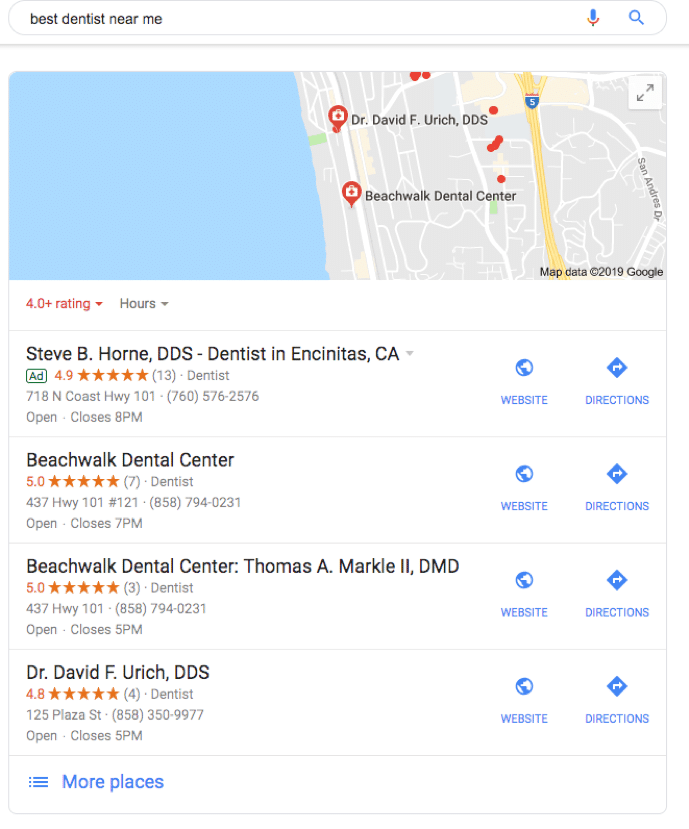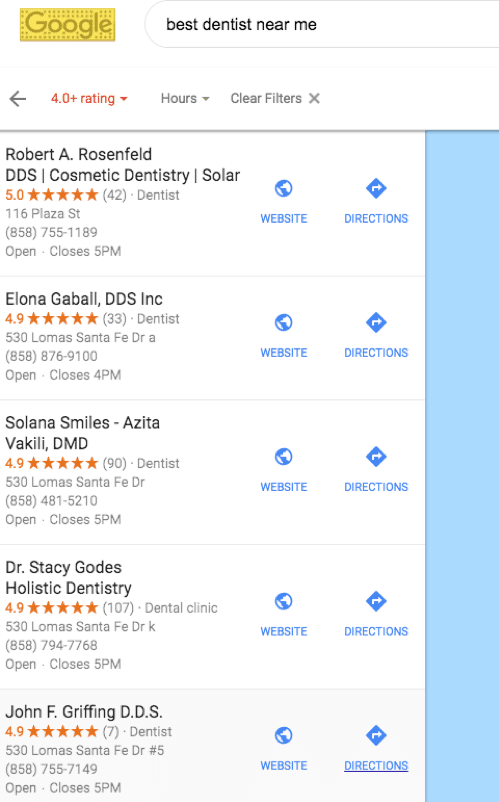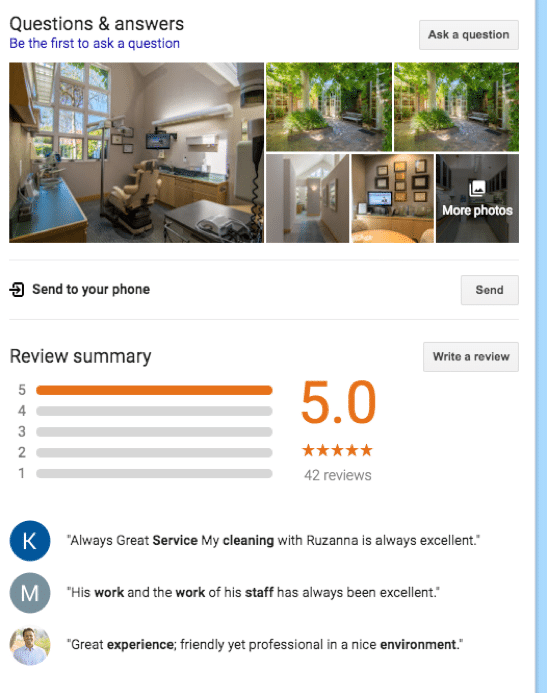
Help Customers Find Your Business by Focusing on the Right Review Platforms
Did you know that 90% of customers read online reviews before visiting a business?¹ Not only that, but most of them trust and value these third-party opinions as much as if they were a personal recommendation from a friend. While reviews are a valuable tool for building your reputation and establishing trust in your community,...
Did you know that 90% of customers read online reviews before visiting a business?¹ Not only that, but most of them trust and value these third-party opinions as much as if they were a personal recommendation from a friend.
While reviews are a valuable tool for building your reputation and establishing trust in your community, they can also do much more. Think of reviews as a way to grow your business and put lead generation on autopilot. Reviews compliment SEO efforts, and they provide you with authenticity and credibility, encouraging prospects to take action by reaching out to your business.
If you are looking for an easy way to gather more online reviews, make sure to take a look at Weave’s review feature.
If you haven’t put much thought into gathering reviews, we’ll help you determine where to place your focus, and further expand on what you can do to turn your online reviews into a valuable business asset.
(Listen To Audio Version of this Post Below)
Why Positive Online Reviews Matter
As the equipment in your office, your reviews are an asset. However, unlike office equipment, you don’t buy them. Further, instead of depreciating, this asset will continue to grow in value, as long as you maintain it.
Here are the top 10 benefits that online reviews can provide your business:
- Establish trust and credibility: Dozens of positive reviews provide a powerful cue that you’re a legitimate business and talented at what you do.
- Educates your audience: Reviews can share information that helps potential clients and patients know what to expect from your office.
- Segmentation: The content of your reviews gives potential clients an idea of where you excel and where you might not be a good fit for their needs.
- Requires little time from your staff: A few in-depth and well-written reviews can serve as a virtual salesperson. These reviews will bring you leads day in and day out, without your staff or an agency having to create ads, distribute email blasts or engage in outreach. While we still recommend doing all of these things, your reviews are a valuable and low-cost addition to your marketing mix.
- SEO: Customers tend to use keywords in their reviews. Example: “Dr. Hutchins is the best dentist in Dallas!” A potential client using a search term like “best dentist Dallas” on Google is now more likely to see your business served up in the results. Similarly, “Mr. Hatch is the best plumber in Dallas!” A potential client using a search term like “best plumber Dallas” on Google is now more likely to see your business served up in the results.
- You can adapt their language: Pay close attention to how a client or patient describes your business and services. You can then mirror that language in your marketing, whether it’s an email blast, an ad on social media or a brochure. We also recommend using their terminology on your website to strengthen your SEO strategy.
- Repurpose the reviews: Use snippets of the reviews for testimonials on your website and in advertising. Share them with media outlets for potential press coverage. For example, if you happen to be part of a dental practice and have dozens of positive reviews from parents about how their kids no longer fear their dental appointments, you could approach the local news stations about doing a segment on how to help children get over their fear of going to the dentist. This concept of repurposing reviews can be applied to businesses in all industries.
- Learn and improve: Read all of your reviews and look for any patterns or potential issues that are negatively impacting your clients. Do clients who come to your office during the noon hour have to wait too long to be seen? Is your office manager giving clients the cold shoulder? This feedback will help you address any issues before they become more damaging to your business. Alternatively, you could also get valuable feedback about where you’re doing well. You might not have realized some of the things your clients love most about your business.
- Competitive research: We also recommend that you read the online reviews written about your competitors to see where they’re doing exceptionally and where they’re faltering. Look at these with an objective lens so that you can discover how you measure up.
- Strengthen relationships: Thank your clients that leave positive reviews and approach the negative reviewers to apologize and ask for additional feedback.
9 out of 10 people check online reviews before choosing a business
Weave helps you easily collect and monitor reviews on Google and Facebook. These reviews can be some of the best marketing for your business.
Schedule DemoOnline Reviews Illustrated
As customers search online for service providers, reviews are one of the first things they see.

The above screenshot shows the results of a Google search query titled “best dentist near me.” Directly below a couple of ads is a map showing nearby dentists and an image of their review ratings.
Notice that only the top few show up, and there’s not necessarily a correlation between the number of reviews you have and your placement. As a potential client, these search results might not inspire a lot of trust, since these dentists don’t have many reviews. If you click on “More Places,” you’ll see even more reviews.

Now, customers can scroll through these offices and click one someone they’re interested in learning more about. Once a potential client clicks on an office name, they’ll get to see more information about the business including an in-depth look at the reviews. This information can go a long way toward helping a potential client decide if your office is a good fit, and it’s perceived as more objective and less “salesy” than what’s on a business’s website.

The above example is from Google, but is that the only place you should place your focus? Definitely not! We’ll share our top four sites to build your reviews and discuss why should balance your efforts between multiple platforms.
Best Online Review Sites
You don’t have to scramble to get reviews everywhere. We recommend that you identify where your client base goes to get information and then focus your effort on those platforms. For most businesses, the best place to focus is in the following order:
- Yelp
- Niche Online Review Sites
We’ll discuss each of these in more detail.
Google is still the top search engine, and it is responsible for 68.75% of all search queries.² Still, more than a quarter of business don’t have a single Google review! At the time of publication, the average number of Google reviews a local company has is 39. This means that it won’t take hundreds of reviews for you to stand out from the competition.
While Google is an excellent place to start gathering reviews, it shouldn’t be your only focus. One of the biggest reasons is that not everyone has a Google account, and you must have one in order to leave a review. Second, we mentioned earlier that just over two-thirds of search queries are done through Google. That leaves out nearly a third.
Something else to note is that not all Google search results will even show your business name and reviews. Typically, only a handful of business shows up in the snippet with the review scores. A client would have to click the “More Places” link to see other reviews. The only way to be guaranteed that your business will show up is if the potential customer specifically searches for your business.
Yelp
Yelp was one of the first online review platforms to gain critical mass, and its brand name has become synonymous with reviews. One of the best things about Yelp is that it’s easy to use and they even have an app.
Over the years, Yelp has become somewhat of a social network. Reviewers can add each other as friends, provide feedback about a review and even mark it as useful, funny or cool. Users are further incentivized to leave reviews that are well-written and helpful with the dangling carrot of becoming “elite,” which adds a special badge to your account and entitles you to attend exclusive openings and events.
One of the main reasons we recommend focusing on getting Yelp reviews is that in addition to being a go-to destination for people looking for reviews, it’s also ranked prominently on Google. In nearly every search query of “Best {insert business type} near me” or “Best {insert business type} {insert city}”, Yelp will claim the top two organic spots in Google, right after the ads and Google Places section.
Therefore, if you’ve got excellent reviews on Yelp, your business will stand out when someone searches for a business in your space and clicks on Yelp link.
Recently, Yelp has been criticized for allowing fake reviews to be displayed on their site. This can happen when an unscrupulous business illegally incentivizes customers to leave reviews, or worse, pays people who aren’t clients to write reviews to boost their numbers.
Another known practice is trolls hired by competitors to leave negative reviews for a business. Yelp has responded by instilling a filtering mechanism that either suppresses or deletes reviews they believe are fraudulent. However, their algorithm isn’t perfect, and it’s not unusual for legitimate reviews to also be censored.
A final factor to keep in mind is that Yelp is a more competitive review platform, meaning that businesses could easily have hundreds of reviews. It can be harder to stand out, especially now that Yelp is cracking down on businesses that openly ask the customers to review them on this platform.
To encourage reviews without getting in trouble, the current best practice is to display Yelp stickers and signage at your location. These markers will serve as a gentle nudge, encouraging more reviews. Yelp will give you everything you need for free.
About two-thirds of Americans have a Facebook account. And while you might have heard stories about Facebook’s platform dying or not growing, there are some caveats to consider.
First, in the US, more than 80% of people between the ages of 25 and 29 have an account. That number is close to 80% in the 30 to 49-year-old demographic. So, if your client base is in those age groups, they’re definitely on Facebook, and they’ll be likely to see your reviews.
If your client demographic is over 65, note that over 40% of them are on Facebook, making it a convenient place to reach a demographic that might not be savvy at performing Internet searches or navigating Yelp.
Another reason we love Facebook for online reviews is that you can combine your advertising strategy with your review strategy. For example, you can run ads on Facebook using your reviews as the content. While you can also do this type of advertising on Google, the cost you’ll pay for a click on Facebook is likely to be a fraction of the cost as Google. So, if you have a modest budget, Facebook is an ideal ad channel to start with your advertising strategy.
Niche Online Review Sites
Each industry has specialized review sites and many overlap. One of the first to emerge was Angie’s List, which initially featured home services. It’s now extended to medical professionals and other industries. Other online review platforms in the medical field include Health Grades and Zocdoc. There are also specific online review sites that are restricted to a profession. For example, dentists have 1-800 Dentist, Rank My Dentist, Dentists.com and others.
To find the most relevant online review platforms for your industry, search for: “{insert profession} review sites” and you’ll see the top-ranked sites for your profession.
Niche online review sites aren’t as heavily utilized as mainstream platforms like Google, Yelp, and Facebook, so use these as a supplement to your efforts on these other platforms, not a replacement.
Conclusion
When it comes to online review platforms, smart diversification is key. While it’s dangerous to put all of your eggs in one basket, spreading yourself too thin is bound to be ineffective. We recommend taking a more concentrated approach, focusing your efforts on the major players like Google, Yelp, and Facebook, while also having a presence on niche review sites that are relevant to your industry. For help with your review process watch a free demo from Weave.
Resources:
Get the best of Weave, right in your inbox.
Ready to grow your practice?
See firsthand how Weave can help you grow your practice.


